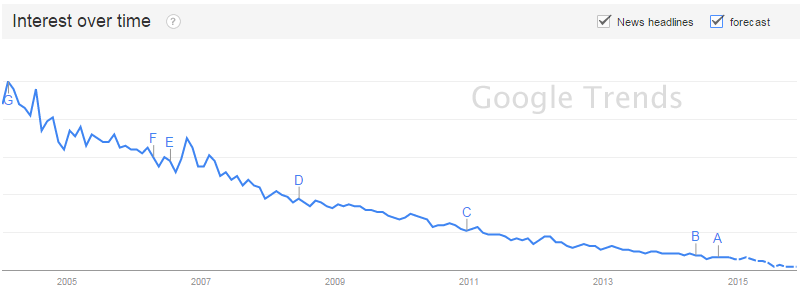Update – DMOZ is closed for Business
A recent Article by Cornerstone Links titled What Happened to DMOZ.org? As we may have predicted from our article, AOL closed their support for DMOZ in 2017. the Cornerstone Article is a good overview of what happened to DMOZz.
Introduction
DMOZ or the open directory was intended to organise the web. This directory is owned by Netscape, maintained by a community of volunteer editors and was reported to be ‘supported’ by Google.
The submission rules for getting listed on DMOZ are strict and while it may be considered to be good for SEO to be listed on the Open Directory, it can be very difficult to be get listed in the appropriate category on DMOZ. In recent years, there has even been the suggestion that DMOZ has become insignificant and is of little value to SEO.
So what happened?
Initially Google ‘supported’ DMOZ by using information and links on DMOZ to supplement the Google search database. There even was the belief that listing on DMOZ is a factor in the Google ranking algorithm. Consequently, website owners considered getting listed on DMOZ to be essential for search engine ranking position (SERP). In 2000 Google created its own directory and used DMOZ as the main source for the Google directory however, a decade later (late 2010), the Google directory was shut down and Google stopped supporting directory search. The impact of being listed on DMOZ for SERP diminished and as Google is by far the primary player in the search sphere, DMOZ became less relevant.
Aside from SERP, have you ever tried to be listed? It can take years to be listed on a more popular category even if this is the most appropriate category for your site. This is especially the case if the editor doesn’t take the volunteering task seriously or is overwhelmed by the number of listing requests received. Therefore, the ‘volunteer’ nature of the editors of DMOZ is most likely to be the biggest contributor to the loss of popularity of DMOZ and may ultimately lead to its demise.
The ratio of websites to volunteers has increased over the years and inclusion requests can easily become burried in the editors inbox. Web site owners are likely to give up on submitting their sites if these are never listed and if DMOZ is unable to keep up with the new sites and newer more relevant sites are not listed quickly, then DMOZ itself becomes nothing more than a huge list of sites that is difficult to search and is not entirely relevant.
Is this a real effect?
Visitors to a site are always a good indicator of the popularity of the site and it is fair to say that a reduction in the number of visits is a good indication of a loss of popularity. Alexa provides a number of metrics that you can access for any site including DMOZ (http://www.alexa.com/siteinfo/dmoz.org). Below is a chart from Alexa showing the estimated percentage of visits to DMOZ from a search engine. If you don’t like this metric, try the other options on DMOZ. Either way, you are likely to come to the same conclusion, namely that DMOZ is becoming less popular.

DMOZ VisitTrend – there goes our popularity. Surprised? If you ever tried to get listed, I am sure you aren’t.
The bottom line…
The bottom line for me is that, whether or not DMOZ is important for ranking, the effort in chasing a ranking is not worth the return for SEO and therefore, I therefore consign DMOZ to the waste of time SEO bin after the first submission.
What can be done?
DMOZ needs to re-discover itself. It needs to find better more efficient ways of getting sites listed. If the human volunteer part of getting listed on DMOZ is to remain, then there needs to be more humans, better vetting tools, and improved checks on the volunteer editors. There needs to be visible metrics for each submission category. How about a measure of how many days on average for a site to be listed and/or the number of outstanding submissions.
In the new web world where engaging with people is central to any web experience, DMOZ needs to find some way of interacting / engaging with users and giving more than just some obscure listing somewhere in a mammoth database.

Recent Comments